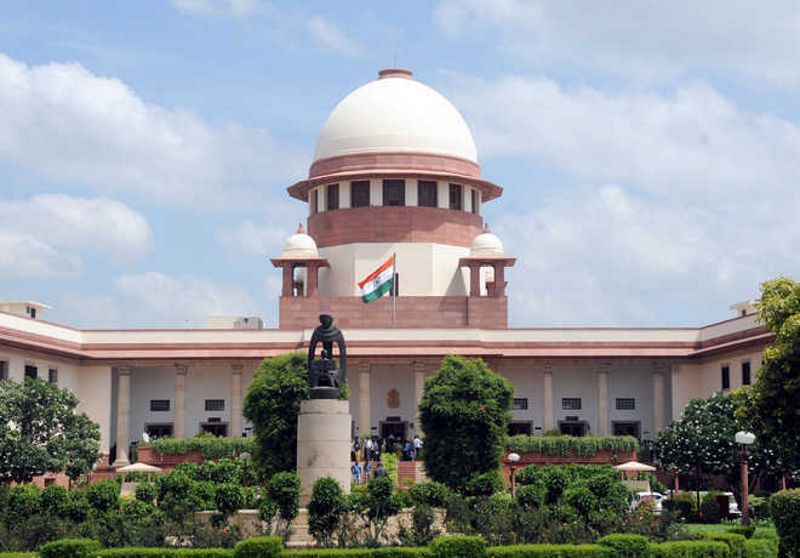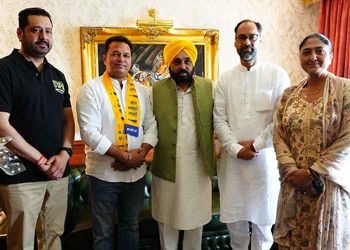
INDIA’S political economy has increasingly centred on a politics-business nexus over the past decade. The Supreme Court’s decision to scrap the electoral bond scheme as unconstitutional has provided considerable insight into the relationship forged by the new elites since 2014, even though these ties have existed since the neo-liberal economic reforms of the early 1990s. - File photo
Zoya Hasan
Professor Emerita, Centre for Political Studies, JNU
The Tribune Debate: Electoral Funding
INDIA’S political economy has increasingly centred on a politics-business nexus over the past decade. The Supreme Court’s decision to scrap the electoral bond scheme as unconstitutional has provided considerable insight into the relationship forged by the new elites since 2014, even though these ties have existed since the neo-liberal economic reforms of the early 1990s. The simultaneous growth of big corporate companies and the rise of right-wing ideology have led to an intersection of business and cultural nationalism that, backed by considerable institutional heft, has drastically reordered the political landscape.
Electoral bonds have undermined democracy by making the political system lopsided in terms of information and money.
The ruling BJP is the biggest beneficiary of this relationship. It has benefited the most from electoral bonds, though it is not the only party to get funds through this route. Other parties, too, have received significant funding through this dubious system. However, it was the BJP that introduced and institutionalised an opaque system of party funding.
Corporates have been fervent supporters of Prime Minister Narendra Modi and his government. In 2013, they had promoted him as the prime ministerial candidate even before his party proposed his candidature. In a recent opinion poll, several CEOs overwhelmingly approved of the current dispensation.
Big business and corporates have done well under this government’s rule, with several laws meant to favour them being framed. It has used its fiscal and financial powers to provide largesse to the corporate sector through tax cuts, concessions and loan write-offs to big defaulters. During the past six years or so, the corporate sector generously donated electoral bonds to the ruling party.
Major industry associations — notably the Federation of Indian Chambers of Commerce and Industry, the Associated Chambers of Commerce and Industry of India and the Confederation of Indian Industry — had petitioned the Supreme Court to defer the disclosure of the electoral bond unique identification numbers that would reveal who paid whom. But the court rightly refused to entertain petitions on this issue. Transparency cannot be ensured by protecting donor privacy, and yet, various public and private sector institutions, from the State Bank of India (SBI) to the Election Commission of India (ECI), and industry lobbies have been working overtime to obfuscate transparency despite the striking down of the scheme as ‘manifestly arbitrary’ by the apex court.
The SBI, after much dithering and dilly-dallying, submitted the electoral bond details to the ECI, which uploaded them on its website. These include the unique numbers attached to the bonds, which would help the public access information to match purchasers of the bonds with the parties that redeemed them. But even without these details, it was clear that this scheme had legalised corruption, even as the government had been running a crusade against corruption and black money.
Four broad trends have emerged from the revelations: quid pro quo, extortion, misusing shell companies to fund parties and protection against government or agency action. Several of the bond donors are under investigation by a range of Central agencies. Many companies that faced regulatory action purchased electoral bonds, with considerable sums of money donated to the BJP. ED raids are purportedly linked to major donations to the saffron party, given out of alleged fear or threat or the promise of lucrative commercial contracts or the assurance of operating under the protective umbrella of the state apparatus once they donate a huge sum of money. The quid pro quo deals between purchasers and redeemers of bonds were designed to enrich the ruling party and extend protection to those who supported it financially.
The electoral bond scheme is one of the biggest scams legalising political corruption. In the past, several corruption charges were based on unproven allegations. But in this case, there is plenty of evidence of quid pro quo arrangements between the companies being investigated and the purchasers and recipients of electoral bonds that establish the benefit trail. However, the electoral bond issue goes far deeper than the problems of corruption and campaign finance. This is a case of full-fledged crony capitalism, with one party using the state as a means for its furtherance and continuation in power. This will have deleterious consequences for the polity and the economy because big businesses and moneybags are allowed to flourish as the government tweaks policies in their favour, in complete disregard for the larger interests of the population. Both the government and the corporate classes have used the scheme to benefit from each other, rather than to clean up election financing. In doing so, crony capitalism has ended up widening the gap between the rich and the poor, even as the latter are still struggling to earn a minimum wage and access quality education and healthcare services, both of which continue to suffer from under-investment.
Finally, electoral bonds have undermined democracy by making the political system lopsided, not just in terms of information and money but also the immense scale of financial power at the disposal of one party compared to the others. The BJP received Rs 8,252 crore of Rs 16,492 crore redeemed through bonds, which is half the value of the bonds issued since 2018. In addition, it received nearly
Rs 5,000 crore of Rs 7,726 crore of non-electoral bond donations given to parties between 2013 and 2023. The BJP’s swelling treasure chest is an indication of how skewed the electoral playing field is, which clearly subverts democracy and the institutions running it.
Join Whatsapp Channel of The Tribune for latest updates.




























